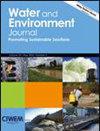从塑料垃圾中开发用于电容去离子的功能性碳电极,以实现可持续的水回收
IF 1.8
4区 环境科学与生态学
Q4 ENVIRONMENTAL SCIENCES
引用次数: 0
摘要
本文章由计算机程序翻译,如有差异,请以英文原文为准。

An insight on the development of functional carbon electrodes from plastic waste for capacitive deionization towards sustainable water reclamation
Capacitive deionization (CDI) is an emerging electrochemical‐based adsorption system that has a high capability for the water reclamation with future potential towards an energy‐efficient and cost‐effective technique for industrial implementations. However, the higher cost of electrodes and poor performance limit its scale‐up, and there is a need to focus on a cost‐effective electrode towards economic impacts. Among the various waste resources, plastic sources would be the better precursor for carbonization as the plastic‐derived carbon possess enhanced surface properties and high electrochemical stability. Further, the carbonization of plastic products towards electrode minimizes greenhouse gas emissions, maintains environmental sustainability and achieves a dual benefit of circular economy with water reclamation. This paper highlights the overview of CDI, the significance of electrodes in CDI for electrosorption studies, various synthetic routes of plastic‐derived carbon, and its properties that help the researchers to focus on zero waste discharge‐based CDI process.
求助全文
通过发布文献求助,成功后即可免费获取论文全文。
去求助
来源期刊

Water and Environment Journal
环境科学-湖沼学
CiteScore
4.80
自引率
0.00%
发文量
67
审稿时长
18-36 weeks
期刊介绍:
Water and Environment Journal is an internationally recognised peer reviewed Journal for the dissemination of innovations and solutions focussed on enhancing water management best practice. Water and Environment Journal is available to over 12,000 institutions with a further 7,000 copies physically distributed to the Chartered Institution of Water and Environmental Management (CIWEM) membership, comprised of environment sector professionals based across the value chain (utilities, consultancy, technology suppliers, regulators, government and NGOs). As such, the journal provides a conduit between academics and practitioners. We therefore particularly encourage contributions focussed at the interface between academia and industry, which deliver industrially impactful applied research underpinned by scientific evidence. We are keen to attract papers on a broad range of subjects including:
-Water and wastewater treatment for agricultural, municipal and industrial applications
-Sludge treatment including processing, storage and management
-Water recycling
-Urban and stormwater management
-Integrated water management strategies
-Water infrastructure and distribution
-Climate change mitigation including management of impacts on agriculture, urban areas and infrastructure
 求助内容:
求助内容: 应助结果提醒方式:
应助结果提醒方式:


